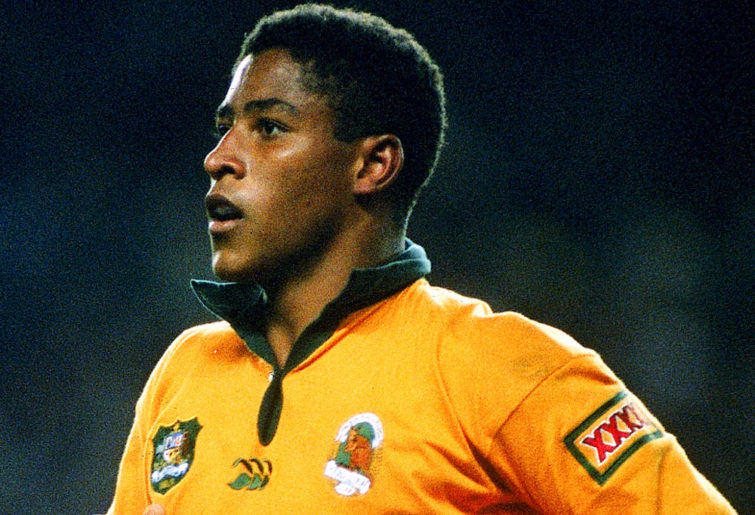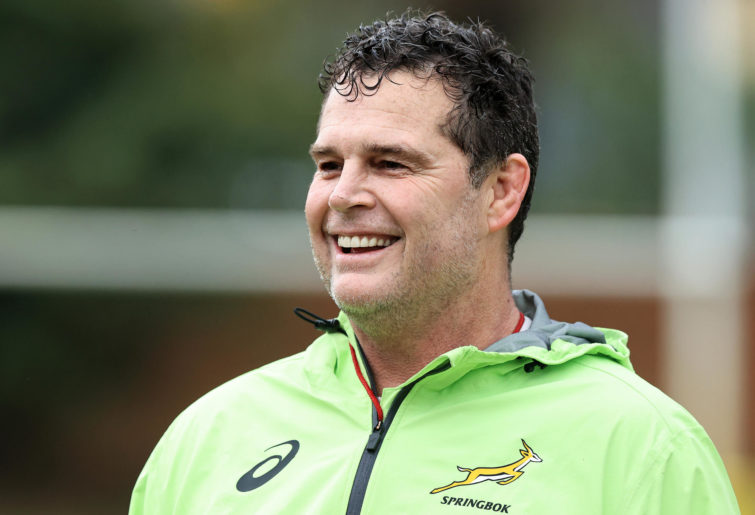Being a New Zealander, it is against our DNA to admit that a certain Aussie rugby player is, actually, rather good.
The level of hatred is only matched by the level of respect. I am sure you Aussies feel the same about Sean Fitzpatrick and Richie McCaw.
Growing up, it was passed down to us to hate the ‘arrogant Aussies’ and any All Black was superior to the Australians.
Back then, the Wallabies were an exceptional rugby team so beating them was a major priority, just below the South Africans.
I have watched many games over the past few weeks from the 1990s and there were some superb matches played between the two countries – and some wonderful Australian rugby players who, without the blinkers of hatred on, I can appreciate far more now.

George Gregan of the Wallabies. (Photo by David Rogers/Getty Images)
The first player to stand out is a tall gentleman with the most complete range of skills ever.
Yes, that was extremely difficult to say!
John Anthony Eales could do it all.
Tall, athletic, famed for cover tackles, could kick a drop goal, was a goalkicker, captain, could run with the ball, supreme in the lineout – the list goes on.
After a drop goal from halfway for Brothers versus Teachers-Norths, he said, “Nobody would have said anything if I had scored a try and that’s worth more points.”
Has there been a more complete player? His story is one that many young rugby players should use for inspiration, an Australian childhood from the suburbs of Brisbane to captain of a World Cup-winning team.
Eales was born in Brisbane in 1970 to Jack and Rosa, and attended Marist College in Ashgrove. The death of his sister Carmel when he was 18 had a profound impact on his life, with the tragedy galvanising his motivation.
From then on, everything he did was in her memory, and she was the inspiration to make the most of every day and to give everything one hundred per cent.
If the mind is distracted by other events, it can help people to have a more relaxed attitude towards a major goal or challenge. If the sole focus is on one goal, if that goal is not achieved it leaves people feeling down. An all-round lifestyle with other pursuits should be the aim.
The pressure on Eales was his sister’s passing, not some game that involved chasing after a ball, so his mind was free to enjoy rugby’s challenges.
“Rugby shouldn’t be something that creates pressure, it should be something that creates hope. We have a privilege of giving hope – it’s not a burden,” explained Rassie Erasmus after his Springbok team had won the World Cup in 2019.

Rassie Erasmus (Photo by David Rogers/Getty Images)
We need something else to take our minds off what we are trying to achieve.
Of course, that’s not how Eales would have wanted things to pan out.
Legendary Australian cricketer Keith Miller, who was also a decorated air force pilot during World War Two, famously stated: “Real pressure is when you are flying a Mosquito with a Messerschmitt up your arse!”
I guess the point I’m trying to make is that if you want to achieve a goal, look at how achieving that goal will help others, not just what it will do to yourself.
What sort of person, player would John Eales have been without his sister’s passing?
Many rugby followers will be aware of his achievements in rugby but may not be aware he was an exceptionally good cricketer who played first grade for Queensland University. I believe at some point he kept out or played with future Australian cricketer, Matthew Hayden.
One of his notable achievements in rugby was winning 11 Tests against the All Blacks and losing nine. How many of today’s players would envy such a record?
He, of course, kicked the winning penalty goal against the All Blacks in 2000. I must add a New Zealand influence on Eales’ goalkicking, as he picked up some vital tips from Grant Fox. There is some similarity between their two styles. John became one of the highest scoring forwards in Test history due to his goalkicking.
He captained Australia in 55 matches, including the 1999 World Cup, second to another outstanding player, George Gregan’s 59 caps.
Two All Blacks had opposing opinions about Eales when he was first starting out, Colin Meads said he would be around for ten years after watching his first game.
Eales made his debut when 21 and retired at 31.
Andy Haden announced “against me, he would last three lineouts”.
His achievements are too numerous to name but include being named Queenslander of the Year in 2002, inducted into the International Rugby Hall of Fame in 2007, and inducted into the Wallaby Hall of Fame in 2011.
Apparently it is a myth that he was nicknamed ‘Nobody’ – as in ‘nobody’s perfect’ – by his teammates. It is one of the better nicknames however.
Eales was one of sport’s most inspirational leaders and transferred that knowledge and experience to the corporate world. He has founded various companies, holds directorships with leading companies, a column with The Australian, and has been a consultant with Westpac.
He has also been an ambassador at the 2007 Rugby World Cup and a liaison officer at the Athens, Beijing and London Olympics.
Is Eales Australia’s greatest ever rugby player? If not, then the person who is, is one incredible player.
Put it this way, John Eales and Colin Meads would have been the perfect second-row combination. I guess nobody is perfect.
Time to stop, too much praise for the Aussies!






























































































